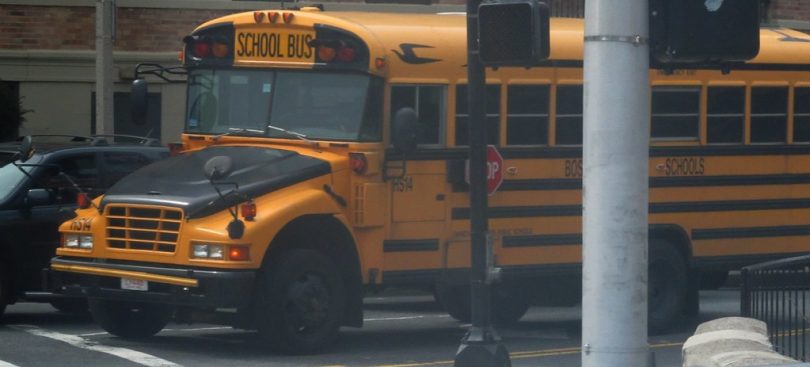By Katharine Swindells
BU News Service
Nicol Riley’s daughter Natalia was three years old when staff at ABCD Roslindale Head Start noticed hyperactivity in the child. Natalia was diagnosed with adjustment disorder, anxiety and severe ADHD. Today, at 10, she reads at a first-grade level.
Despite Natalia being issued a disability learning plan before she began elementary school, Nicol says the Boston Public School system has failed to provide the support her daughter needs, leaving Nicol feeling as though she is the only one fighting for her daughter.
“I’m a single mom. I also have to take care of my son, do dinner and bath time, and I feel so guilty that I can’t support my daughter myself,” she said through tears. “The resources in schools are stretched too thin. There’s not enough money.”
Natalia is far from alone. One in five children in the country have a mental, emotional or behavioral disorder, according to data from the Center for Disease Control and Prevention, and only 20% of those are getting help from a specialized mental health provider.
Massachusetts is one of the best states in the country for mental health care. A study from Mental Health America (MHA) ranks the state fourth for access to care for youth. But over half of children with major depression in the state receive no treatment.
And it’s only getting worse.
The MHA data shows the number of youth in the U.S. coping with severe depression increased by 121,000 between 2016 and 2017. A 2014 study published in JAMA Psychiatry comparing the three-year periods 1995-1998 and 2007-2010, found that visits to psychiatrists have almost doubled for those under 21, while it only increased by 6% for those above the age bracket.
Boston Public Schools, alongside school systems nationwide, are trying to respond to the crisis. But many officials said money to hire trained professionals is tight, and setting up programs to deal with the myriad of disorders is complicated and time-consuming.
Experts worry that amid the mounting crisis, the rush to be seen responding to political demand could compromise finding the most appropriate care for the complex needs of the students.
In April, Boston school officials reached an agreement with the Boston Teachers Union to fund 23 additional full-time mental health staff in public schools, to give every school access to a mental health specialist for their students.
However, Boston City Councilor Annissa Essaibi-George is challenging BPS over the pace of the hiring, as BPS say they plan to hire the full 23 by September 2021, with the first 10 being hired this academic year.
“It’s disappointing and it’s frustrating,” said Essaibi-George, a former high school teacher who now chairs the Council’ Education Committee. “I think the process that we participated in over the budget cycle was disingenuous.”
However, Dan O’Brien, a spokesman for the BPS superintendent’s office said the plan was always to hire the new psychologists or licensed clinical social workers over a three-year period and that the school system is in fact ahead of schedule.
“Because of the highly specialized needs of individual school communities, the hiring process must be thoughtful to ensure the proper selections are made,” O’Brien said. “We must assess the needs of students and schools and account for what supports currently exist for each school.”
Boston Public Schools’ method of placing specially trained staff, either psychologists or licensed clinical social workers, directly within schools is believed by many experts to be a clear step towards tackling the crisis. By working within schools, mental health providers are able to reach children in their natural environment, and barriers to accessing treatment, such as working parents or transportation, are eliminated.
Currently, Boston schools organize and budget for their own mental health provision. But Michelle Novelle, a board member of SchoolFacts Boston, an organization that studies the BPS system, said this means the mental health provision can vary between schools. Novelle says a district-wide approach would be more equitable.
Novelle is a social worker specializing in child trauma and has five children currently enrolled in BPS. She said one of the key benefits of placing support within schools in the same way across the district, is that it would allow external specialists such as herself to better navigate the school system.
It also takes the pressure off of teachers, who are having to step into mental health treatment roles for which they are not equipped, which Novelle says can lead to the wrong type of help for students.
“Teachers are asked to perform so many functions that are not in their areas of expertise,” she said. “I think it’s an unfair burden to place on teachers, which leads to misdiagnosis as teachers to try to make sense of things.”
John Crocker, director of School Mental Health at Methuen Public Schools, which has been recognized as a state leader in school mental health, said the onus has to be on schools to take responsibility for children’s mental health.
“The referring-out model doesn’t work,” he said. “Giving children a referral and then washing our hands of the case, that’s poor practice. The buck stops with us.”
Ryan Madigan, director of Boston Child Study Center, a child psychology treatment center that provides training and consultancy to schools, said the vast majority of their clients face anxiety, depression and low self-worth, which he said stems from competitiveness within schools, pressure from parents and social media, which encourages young people to compare themselves to others.
Novelle, who works with young people in urban areas and more disadvantaged communities, said much of what is diagnosed as mental health issues in young people can be a reaction to very real trauma and struggles in their home life and community, so schools need to hire staff who are able to see beyond the classroom.
Novelle said those responsible for hiring should make sure new mental health workers have specific skills – such as bilingualism or expertise in opioid-related trauma – that would be a good fit for their school. Such precautions would reduce the risk of high turnover, which could be detrimental to students who form bonds with the staff member.
Creating significant change in Boston schools could require years of development with community and university support. But for those like Nicol and Natalia, who have been struggling for close to a decade, the news that this is a complicated and slow process is frustrating.
“I want to fight for my child and protect her, but I don’t know how it all works. I don’t know where to go,” Nicol said. “I just have to place my trust in these people and this system that they’re going to look after her. And I don’t.”





